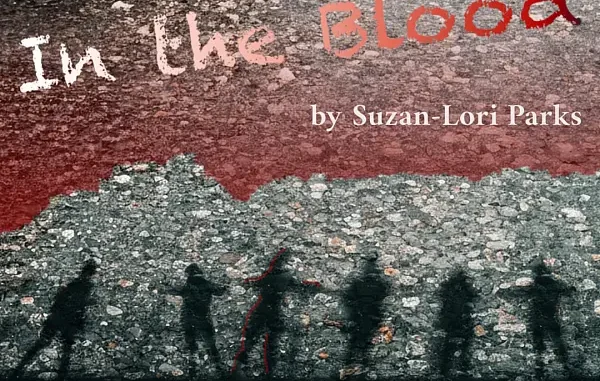
The Department of Theater and Dance’s run of In the Blood by Suzan-Lori Parks is one of my favorite productions that I have performed in so far. I have been acting since the 6th grade, when my parents signed me up for acting classes at a small playhouse in my home state of New Jersey. I have been involved in theatre throughout my life, and I fell in love with it so much that I made it one of my two majors. So, why was In the Blood different? Well, other than the distressing topics presented… for the first time ever, I played the antagonist.
In the Blood, which ran from October 30th to November 2nd, follows Hester la Negrita, a single mother of five children, each of whom has a different father. Each adult she encounters (whose actors also play her children) represents a system that she turns to for help: the healthcare system (Doctor, played by Mel Petro ‘27), religious institutions (Reverend D, played by me), welfare system (Welfare, played by Mia Bompensa ‘28), the patriarchy (Chili, played by Nasir Kellman ‘29), and sex work (Amiga Gringa, played by Maggie Diaz ‘28). Hester is a poor Black woman who constantly gives herself (both emotionally and sexually) to others to try and improve her and her children’s lives, only for those people to abuse her. She is constantly talked down to, chastised, and even sexually abused. All of this leads her to kill her completely innocent oldest son from her first love.
When I auditioned, I swore I bombed it. In my head, it was one of the most embarrassing auditions I have ever done. I thought I had missed my chance to act in a play this semester, so the callback sheet was a surprise. I went, and the director, AZ Espinoza, had me read for two characters: Doctor and Reverend D. Reflecting on it, I had a feeling I would get Reverend D. I was typically cast as the loud character, usually the one providing comic relief. In the Blood is a tragedy with absurdist elements. (For example, grown adults play little children.) So, who would the loud character be? Well, the one that finally drives Hester into her spiral of insanity.
When I first saw the cast list come out, I was nervous. As an actor, I got early access to the play before auditions. I did not go into the audition blind, yet I was still blindsided. How would people react when I embodied this character? How would I cope with an audience in front of me as I did horrible things? These were questions that haunted me as I let the reality of the role marinate in my mind.
When the first rehearsal arrived, we didn’t start right away. Instead, we introduced ourselves and read the script out loud. We discussed our feelings as we went along. If it were not for those first rehearsals, I think I would have felt more afraid. It was the start of a small family, both on- and off-stage. We were each other’s support systems. Anxiety was turned into relief, into inside jokes, into laughter.
I learned how to disconnect myself from Reverend D. I needed to set aside Kat Carey’s morals just so I could embody him and his lack of morals. I was not supposed to feel comfortable acting out this character or his actions in the play; he is, after all, the antagonist. He was just borrowing my body for the four shows. I needed to take everything as slowly as I could; it took me a while to make the more uncomfortable words feel more natural. I even needed to explain the topics of the story to my family over October break (which was awkward, trust me).
After opening night and after my friends came to see me, people told me that they hated “me,” so I think the work that I put into it paid off in the end. One of the highest praises you can get as a villain is that the audience disliked you; it means you did your job. It felt weird getting praise for being a horrible person, but it kept me motivated. My loved ones also kept me driven, especially during my most challenging scene. I got to scan the audience, which is really hard because of the bright lights, and stare at people I knew before doing my confessional. It was a way to keep me comfortable while making them uncomfortable. (I love a good oxymoron.)
This semester has been a time of trying new things, and I feel like a brand-new person after every experience. I have never been one to step out of my comfort zone, and doing In the Blood allowed me to take that first big risk that I was craving deep down. I will forever thank the theater department for allowing me to have this experience, and to my castmates, director, and crew members for being some of the best people I have ever worked with. I love this show, and if I had the chance, I would do it again in a heartbeat.
